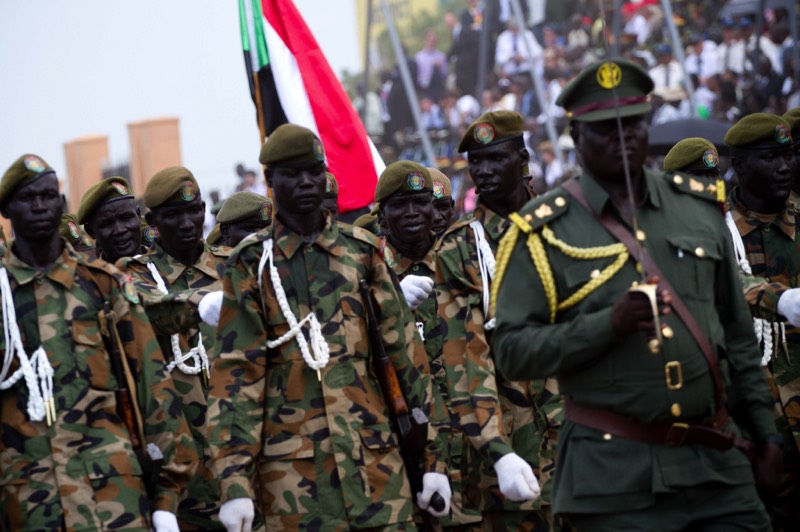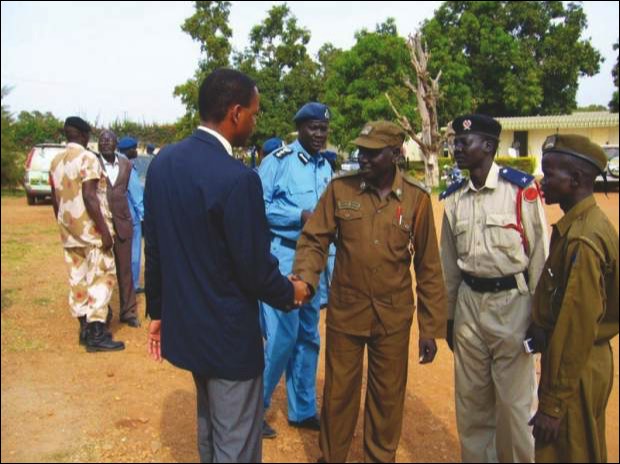A Plan in Sudan:
Truckee police chiefs heads anti-corruption workshop

PUBLISHED: NOVEMBER 24, 2010
By Jason Shueh
Tahoe Daily Tribune
By Jason Shueh
Tahoe Daily Tribune
TRUCKEE, Calif. — The photograph couldn't be more revealing.
Under a bright, hot sun, standing amid a dirt plot bordered by low white buildings and a smattering of verdant trees, brush and jeeps, stands Truckee Police Chief Nick Sensley. He is accompanied by Southern Sudan police forces dressed in uniform, emblem-adorned berets on their heads. They are smiling and look toward Sensley who is dressed in a blue suit coat and gray pants. The photograph depicts Sensley, 48, shaking hands with a young man in a brown cap and military styled uniform. Like others in his group, the man's expression is jubilant, happy, a broad smile spreading across his face.
Under a bright, hot sun, standing amid a dirt plot bordered by low white buildings and a smattering of verdant trees, brush and jeeps, stands Truckee Police Chief Nick Sensley. He is accompanied by Southern Sudan police forces dressed in uniform, emblem-adorned berets on their heads. They are smiling and look toward Sensley who is dressed in a blue suit coat and gray pants. The photograph depicts Sensley, 48, shaking hands with a young man in a brown cap and military styled uniform. Like others in his group, the man's expression is jubilant, happy, a broad smile spreading across his face.

Sitting in his Truckee office last week Sensley said the optimism expressed in the photo is endemic to the Southern Sudanese people as they work toward a peaceful succession from the predominantly Arab and Muslim dominated Northern Sudan on Jan. 9, 2011.
As Sudan's project director for Pointman Leadership Institute Global, a nonprofit leadership development institute, Sensley led an international team to Juba, in South Sudan in early November as the start of a long term national anti-corruption development program.
The trip was made at the request of the Sudanese Ambassador Akec K. A. Khoc after Sensley gave a PLI seminar in May to the Pennsylvania State Police where three Sudanese police generals and one colonel had been in attendance.
The African nation has received international news coverage for the bloody civil war among its current government, the unified Republic of Sudan; the Janjaweed, a group of Arab tribal militias; and the many rebel forces that are a mix of African ethnicities. Most notably, Sudan received world attention in 2003 for its conflict in Darfur, when the rebel Sudan Liberation Movement and the Justice and Equality Movement took up arms against the government, accusing it of oppressing and committing genocide against black Africans in favor of Arabs.
The Darfur conflict set in motion a civil war that has killed more than 200,000 people and displaced more than 2.5 million people internally or externally since 2003.
Despite national news coverage depicting bleakness and a sense of futility, Sensley said hope is far from counterintuitive for the soon-to-be fledgling nation. Holding up an article and pointing to a photograph from the New York Times, Sensley said national media coverage falls short of depicting the true Sudan.
“What these types of pictures don't show is the sense of hope and enthusiasm and energy of the people for this change,” Sensley said. “For this nation that has had at least three, maybe four major peace agreements in the last 40 years — and each one issuing in a return to violence — I think there's a sense that this time we might just make it without the accompaniment of violence.”
However in order to maintain the momentum and firmly establish South Sudan as a progressive new nation, he said great sacrifices need to be made by its leaders, including a commitment against corruption.
Displaying another photograph, Sensley shows a picture of a small white room with fluorescent lighting and long rows of stretched tables. A microphone speaker sticks out of a crowd of uniformed men, tightly packed, note books and bottled waters in hand. It is a photograph of one of the many workshops Sensley conducted with more than 120 leaders from Southern Sudan's civil agencies.
Sensley said the workshops were dedicated toward assessment of South Sudan's law enforcement and a focus on its anti-corruption efforts.
“We try to encourage leaders to really combat corruption because corruption in developing and transitioning nations, in particularly Africa, directly correlates with poverty and ultimately with a variety of human rights abuses,” Sensley said.
To combat corruption, Sensley said PLI — which has helped develop police forces in 57 nations and worked with more than 60,000 leaders world wide — requires nations accept they are vulnerable to corruption and then identify commitments needed to overcome it.
Sensley said he stressed the principals of sacrifice and endurance to Sudan's leadership, because they will be the pioneers of the new nation, and pioneers are required to make sacrifices for future generations.
The comment was not made lightly.
“These are people that when you tell them they need to accept sacrifice and endurance, they know it in the hardest of terms, they really do,” Sensley said.
Understanding the great divide between his American upbringing and the harsh realities in Sudan, Sensley said he didn't pretend to fully understand the struggles of the Sudanese people and leaders or claim to have all of the answers for their nation.
Instead, Sensley said he told leaders who might have a feeling of “That's easy for you to say” that he couldn't help where he was born or what he was born into and neither could they; however, he said it was important for them to see him for what he was, someone who was the beneficiary of someone else's sacrifice and endurance, a sacrifice and endurance Sensley hoped Sudan's leaders will make for their children and their children's children.
“We don't go into to this with ‘Here we come to your rescue. We're coming to tell you what you need to do and how you need to do it' we come here from a sharing perspective,” Sensley said.
In 2005 Sensley said a transformative peace agreement was signed between the current government and South Sudan that established a peace between South Sudan and set the groundwork for the region to be an independent nation.
On Jan. 9 the people of Southern Sudan are to vote formerly in a referendum to decide the country's independence.
Sensley described the 2005 agreement as pivotal for the Southern Sudanese people, halting the bloodshed and uniting ethnicities in support of South Sudan's religious and cultural freedom.
Yet, disputes between the north and south are far from resolved. Remaining issues of confrontation involve setting official boundary lines between the soon-to-be two nations. Another combustible dispute is over Sudan's rich oil resources that are predominantly located in the south, with revenues still to be divided.
Outbreaks of violence between rebel and Janjaweed militias still occur. In May 2008, northern forces stormed the border town of Abyei and burned the area to the ground, killing at least 89 and displacing 90,000. The attack was ignited by a dispute between the south's army after both sides failed to withdraw from the area as agreed under the 2005 peace agreement.
To complicate the equation Sudan's current president, Omar Hassan al-Bashir, has been indicted by the International Criminal Court for war crimes enacted during the Darfur conflict.
Both the Obama administration and the Bush administration have worked throughout the nations' conflict to work toward peace.
When South Sudan becomes a new nation in January, Sensley said he has been invited back to meet with South Sudan's still-to-be-elected president and current ministers.
As Sudan's project director for Pointman Leadership Institute Global, a nonprofit leadership development institute, Sensley led an international team to Juba, in South Sudan in early November as the start of a long term national anti-corruption development program.
The trip was made at the request of the Sudanese Ambassador Akec K. A. Khoc after Sensley gave a PLI seminar in May to the Pennsylvania State Police where three Sudanese police generals and one colonel had been in attendance.
The African nation has received international news coverage for the bloody civil war among its current government, the unified Republic of Sudan; the Janjaweed, a group of Arab tribal militias; and the many rebel forces that are a mix of African ethnicities. Most notably, Sudan received world attention in 2003 for its conflict in Darfur, when the rebel Sudan Liberation Movement and the Justice and Equality Movement took up arms against the government, accusing it of oppressing and committing genocide against black Africans in favor of Arabs.
The Darfur conflict set in motion a civil war that has killed more than 200,000 people and displaced more than 2.5 million people internally or externally since 2003.
Despite national news coverage depicting bleakness and a sense of futility, Sensley said hope is far from counterintuitive for the soon-to-be fledgling nation. Holding up an article and pointing to a photograph from the New York Times, Sensley said national media coverage falls short of depicting the true Sudan.
“What these types of pictures don't show is the sense of hope and enthusiasm and energy of the people for this change,” Sensley said. “For this nation that has had at least three, maybe four major peace agreements in the last 40 years — and each one issuing in a return to violence — I think there's a sense that this time we might just make it without the accompaniment of violence.”
However in order to maintain the momentum and firmly establish South Sudan as a progressive new nation, he said great sacrifices need to be made by its leaders, including a commitment against corruption.
Displaying another photograph, Sensley shows a picture of a small white room with fluorescent lighting and long rows of stretched tables. A microphone speaker sticks out of a crowd of uniformed men, tightly packed, note books and bottled waters in hand. It is a photograph of one of the many workshops Sensley conducted with more than 120 leaders from Southern Sudan's civil agencies.
Sensley said the workshops were dedicated toward assessment of South Sudan's law enforcement and a focus on its anti-corruption efforts.
“We try to encourage leaders to really combat corruption because corruption in developing and transitioning nations, in particularly Africa, directly correlates with poverty and ultimately with a variety of human rights abuses,” Sensley said.
To combat corruption, Sensley said PLI — which has helped develop police forces in 57 nations and worked with more than 60,000 leaders world wide — requires nations accept they are vulnerable to corruption and then identify commitments needed to overcome it.
Sensley said he stressed the principals of sacrifice and endurance to Sudan's leadership, because they will be the pioneers of the new nation, and pioneers are required to make sacrifices for future generations.
The comment was not made lightly.
“These are people that when you tell them they need to accept sacrifice and endurance, they know it in the hardest of terms, they really do,” Sensley said.
Understanding the great divide between his American upbringing and the harsh realities in Sudan, Sensley said he didn't pretend to fully understand the struggles of the Sudanese people and leaders or claim to have all of the answers for their nation.
Instead, Sensley said he told leaders who might have a feeling of “That's easy for you to say” that he couldn't help where he was born or what he was born into and neither could they; however, he said it was important for them to see him for what he was, someone who was the beneficiary of someone else's sacrifice and endurance, a sacrifice and endurance Sensley hoped Sudan's leaders will make for their children and their children's children.
“We don't go into to this with ‘Here we come to your rescue. We're coming to tell you what you need to do and how you need to do it' we come here from a sharing perspective,” Sensley said.
In 2005 Sensley said a transformative peace agreement was signed between the current government and South Sudan that established a peace between South Sudan and set the groundwork for the region to be an independent nation.
On Jan. 9 the people of Southern Sudan are to vote formerly in a referendum to decide the country's independence.
Sensley described the 2005 agreement as pivotal for the Southern Sudanese people, halting the bloodshed and uniting ethnicities in support of South Sudan's religious and cultural freedom.
Yet, disputes between the north and south are far from resolved. Remaining issues of confrontation involve setting official boundary lines between the soon-to-be two nations. Another combustible dispute is over Sudan's rich oil resources that are predominantly located in the south, with revenues still to be divided.
Outbreaks of violence between rebel and Janjaweed militias still occur. In May 2008, northern forces stormed the border town of Abyei and burned the area to the ground, killing at least 89 and displacing 90,000. The attack was ignited by a dispute between the south's army after both sides failed to withdraw from the area as agreed under the 2005 peace agreement.
To complicate the equation Sudan's current president, Omar Hassan al-Bashir, has been indicted by the International Criminal Court for war crimes enacted during the Darfur conflict.
Both the Obama administration and the Bush administration have worked throughout the nations' conflict to work toward peace.
When South Sudan becomes a new nation in January, Sensley said he has been invited back to meet with South Sudan's still-to-be-elected president and current ministers.
© Swift Communications, Inc.
These are people that when you tell them they need to accept sacrifice and endurance, they know it in the hardest of terms, they really do.
Former Truckee Police Chief Nick Sensley
